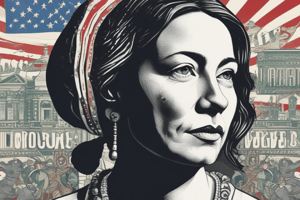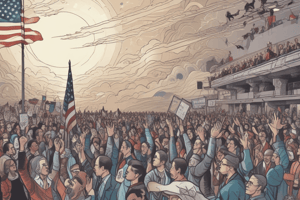Podcast
Questions and Answers
Which action is the MOST direct example of democratic participation?
Which action is the MOST direct example of democratic participation?
- Accepting decisions made by elected officials without question.
- Obeying laws regardless of personal beliefs.
- Paying taxes promptly to support government programs.
- Voting in local and national elections. (correct)
Why is equality considered essential in a democratic society?
Why is equality considered essential in a democratic society?
- It ensures everyone has identical resources and outcomes.
- It minimizes social stratification and class distinctions.
- It promotes conformity and discourages individual expression.
- It guarantees representation and opportunities for all its citizens in the government. (correct)
What is the primary purpose of checks and balances in a democratic government?
What is the primary purpose of checks and balances in a democratic government?
- To expedite the legislative process by reducing debate.
- To centralize power within a single governing body for efficiency.
- To prevent any one government branch or official from becoming too powerful. (correct)
- To ensure the government always acts in accordance with popular opinion.
In what way do plebiscites enhance citizen participation in suggesting policies and laws?
In what way do plebiscites enhance citizen participation in suggesting policies and laws?
How does a politically educated populace contribute to a more competent, firm, and stable state?
How does a politically educated populace contribute to a more competent, firm, and stable state?
Which scenario exemplifies how citizens can uphold change in a democracy?
Which scenario exemplifies how citizens can uphold change in a democracy?
What is the MOST likely consequence of voter apathy in a democracy?
What is the MOST likely consequence of voter apathy in a democracy?
Which of the following scenarios demonstrates an abuse of democratic principles?
Which of the following scenarios demonstrates an abuse of democratic principles?
How does the concept of 'majority rule' function within a democracy?
How does the concept of 'majority rule' function within a democracy?
What role do human rights play in promoting freedom within a democratic society?
What role do human rights play in promoting freedom within a democratic society?
What electoral process involves approving or rejecting a change or amendment to the constitution?
What electoral process involves approving or rejecting a change or amendment to the constitution?
Which of the following scenarios best illustrates the exercise of suffrage?
Which of the following scenarios best illustrates the exercise of suffrage?
In a representative democracy, how is sovereign power exercised?
In a representative democracy, how is sovereign power exercised?
Which event in Philippine history best exemplifies participatory democracy?
Which event in Philippine history best exemplifies participatory democracy?
Why can vote buying be detrimental to a democracy?
Why can vote buying be detrimental to a democracy?
Which of the following actions demonstrates the exercise of freedom of expression in a democratic society?
Which of the following actions demonstrates the exercise of freedom of expression in a democratic society?
What is an essential characteristic of democratic participation?
What is an essential characteristic of democratic participation?
How does democratic participation ensure competent, firm and stable governance?
How does democratic participation ensure competent, firm and stable governance?
How can citizens influence and suggest policies and laws?
How can citizens influence and suggest policies and laws?
How citizens uphold change in a democratic society?
How citizens uphold change in a democratic society?
In democracy, what is the importance of political education to the people?
In democracy, what is the importance of political education to the people?
What is democratic participation?
What is democratic participation?
What happens when a state is ruled with leaders that have dedication and transparency?
What happens when a state is ruled with leaders that have dedication and transparency?
Who remain the sovereign power but its exercise is delegated to the representatives they elect?
Who remain the sovereign power but its exercise is delegated to the representatives they elect?
What does democracy provides to its citizens?
What does democracy provides to its citizens?
Flashcards
Democratic Participation
Democratic Participation
Involvement or engagement freely done, without coercion, threat, or fear.
Equality in Democracy
Equality in Democracy
Democracy provides equal opportunities for all citizens in the government.
Checks and Balances
Checks and Balances
Checks and balances prevent abuse of political power by government officials.
Suggest Policies and Laws
Suggest Policies and Laws
Signup and view all the flashcards
Promotes Freedom
Promotes Freedom
Signup and view all the flashcards
Allows Popular Majority
Allows Popular Majority
Signup and view all the flashcards
Competent, Firm, & Stable
Competent, Firm, & Stable
Signup and view all the flashcards
Political Education
Political Education
Signup and view all the flashcards
Upholds Change
Upholds Change
Signup and view all the flashcards
Plebiscite
Plebiscite
Signup and view all the flashcards
Suffrage
Suffrage
Signup and view all the flashcards
Representative Democracy
Representative Democracy
Signup and view all the flashcards
Study Notes
- Democratic participation involves engagement that is freely done, without coercion, threat, or fear.
Importance of Participation in Democracy
- Democracy ensures equality and provides opportunities for all its citizens to participate in the government.
- Checks and balances within the government prevent potential abuse of political power by officials.
- Suggesting policies and laws allows citizens to influence and suggest policies and laws through plebiscites in selecting delegates or representatives.
- Freedom is promoted where citizens enjoy human rights, enabling engagement in business and innovations.
- The popular majority is empowered to remove a representative or politician who abuses their power.
- Competence, firmness, and stability are achieved when the state is governed by dedicated and transparent leaders.
- Political education is provided to the people, informing them of state affairs.
- The opportunity for citizens to participate in government upholds change.
Assessment Questions
- Undemocratic practices are not legal in a democratic country.
- Democracy is a way to choose leaders during elections.
- Vote buying is not ethical.
- Democracy involves government rule and citizen decision-making.
- In a democracy, the majority wins.
Evaluation Multiple Choice
- A plebiscite is an electoral process for approving or rejecting changes to the Constitution.
- Participation in democracy allows people to engage in business and innovations.
- Representative democracy is when sovereign power remains with the citizens, but its exercise is delegated to elected representatives.
- The EDSA People Power of 1986 was a popular demonstration of participatory democracy.
- If 18 years old, Rina is eligible to elect and cast her votes in a democratic practice called suffrage.
Evaluation True or False
- Democracy provides equality and admission to opportunities for all citizens.
- Participating and contributing ideas is not an undemocratic practice.
- Problems in a democratic society can be solved more easily without manipulation and abuse.
- Participatory and representative democracy encourage active and wider involvement of citizens.
- Choosing who or what one wants to become is a democratic practice.
Performance task
- A performance task requires students to choose a theme about democratic significance and compose a three-stanza poem, rap, or song. Each stanza should contain four lines. The task will be graded via a rubric.
Video Documentary Performance task
- The lesson involves producing a 3-5 minute video documentary that explains the current state of democracy and democratic practices in the Philippines, which also includes the effects of undemocratic practices related to factors such as gender biases, poverty, political marginalization, racial inequality, cultural domination, crisis of representation, and politics of recognition.
- The documentary is based on research questions that address the current state and trends of democracy of practices in the Philippines, undemocratic practices as related to factors such as gender biases, poverty, and any ill effects of undemocratic practices.
- The overall Video will be graded on criteria include clarity of content and sources; media elements; structure; variety and pacing; and production values.
Studying That Suits You
Use AI to generate personalized quizzes and flashcards to suit your learning preferences.





